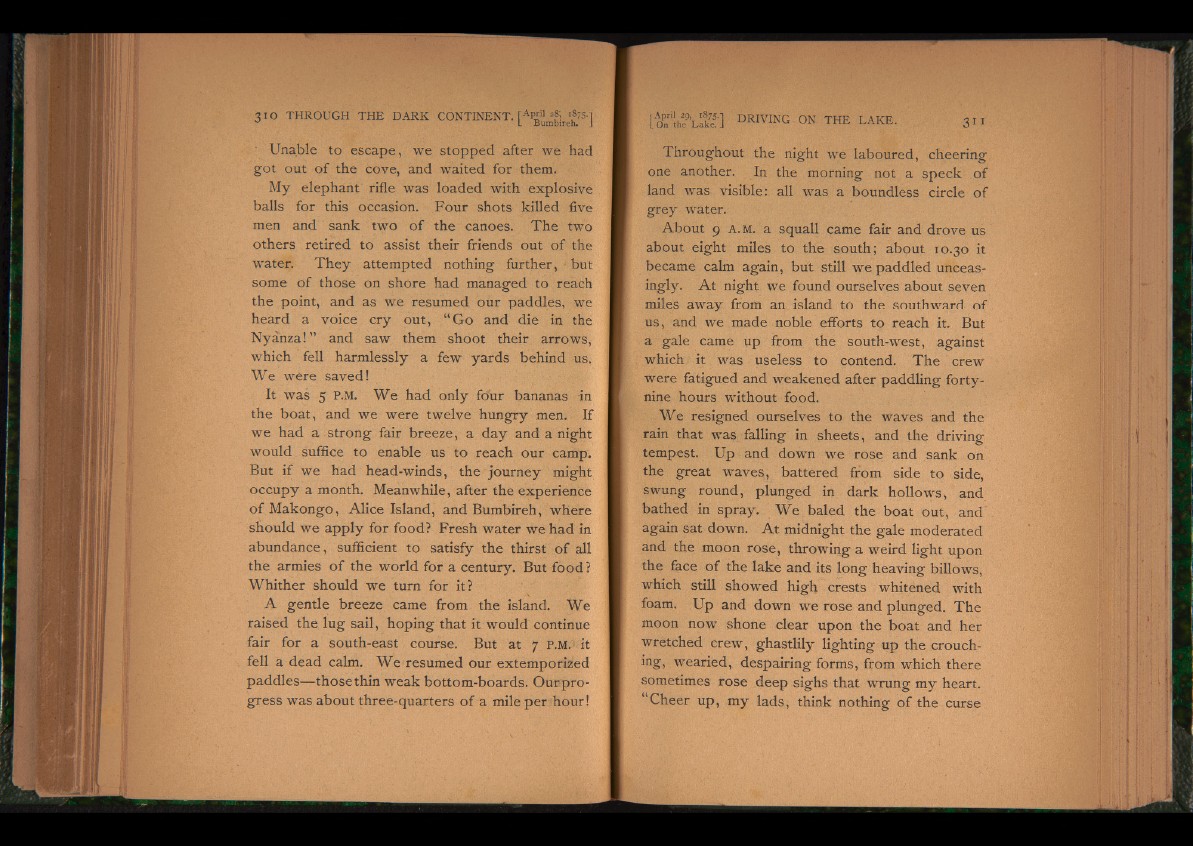
Unable to escape, we stopped after we had
go t out o f the cove, and waited for them.
My elephant rifle was loaded with explosive
balls for this occasion. Four shots killed five
men and sank two o f the canoes. T he two
others retired to assist their friends out o f the
water. T h e y attempted nothing further, but
some o f those on shore had managed to reach
the point, and as we resumed our paddles, we
heard a voice cry out, “ Go and die in the
Nyanza! ” and saw them shoot their arrows,
which fell harmlessly a few yards behind us.
W e were saved!
It was 5 P.M. W e had only four bananas in
the boat, and we were twelve hungry men. If
we had a strong fair breeze, a day and a night
would suffice to enable us to reach our camp.
But if we had head-winds, the journey might
occupy a month. Meanwhile, after the experience
o f Makongo, Alice Island, and Bumbireh, where
should we apply for food? Fresh water we had in
abundance, sufficient to satisfy the thirst o f all
the armies o f the world for a century. But food?
Whither should we turn for it?
A gentle breeze came from the island. We
raised the lu g sail, hoping that it would continue
fair for a south-east course. But at 7 p .m . it
fell a dead calm. We resumed our extemporized
paddles-—those thin weak bottom-boards. Our progress
was about three-quarters o f a mile per hour!
Throughout the night we laboured, cheering
one another. In the morning not a speck o f
land was visible: all was a boundless circle o f
grey water.
About 9 A.M. a squall came fair and drove us
about eight miles to the south; about 10.30 it
became calm again, but still we paddled unceasingly.
A t night we found ourselves about seven
miles aw ay from an island to the southward o f
us, and we made noble efforts to reach it. But
a gale came up from the south-west, against
which it was useless to contend. T h e crew
were fatigued and weakened after paddling forty-
nine hours without food.
W e resigned ourselves to the waves and the
rain that was falling in sheets, and the driving
tempest. Up and down we rose and sank on
the great waves, battered from side to side,
swung round, plunged in dark hollows, and
bathed in spray. W e baled the boat out, and
again sat down. A t midnight the gale moderated
and the moon rose, throwing a weird light upon
the face o f the lake and its long heaving billows,
which still showed high crests whitened with
foam. Up and down we rose and plunged. The
moon now shone clear upon the boat and her
wretched crew, ghastlily lighting up the crouch-
ing, wearied, despairing forms, from wkich there
sometimes rose deep sighs that wrung my heart.
“ Cheer up, my lads, think nothing o f the curse